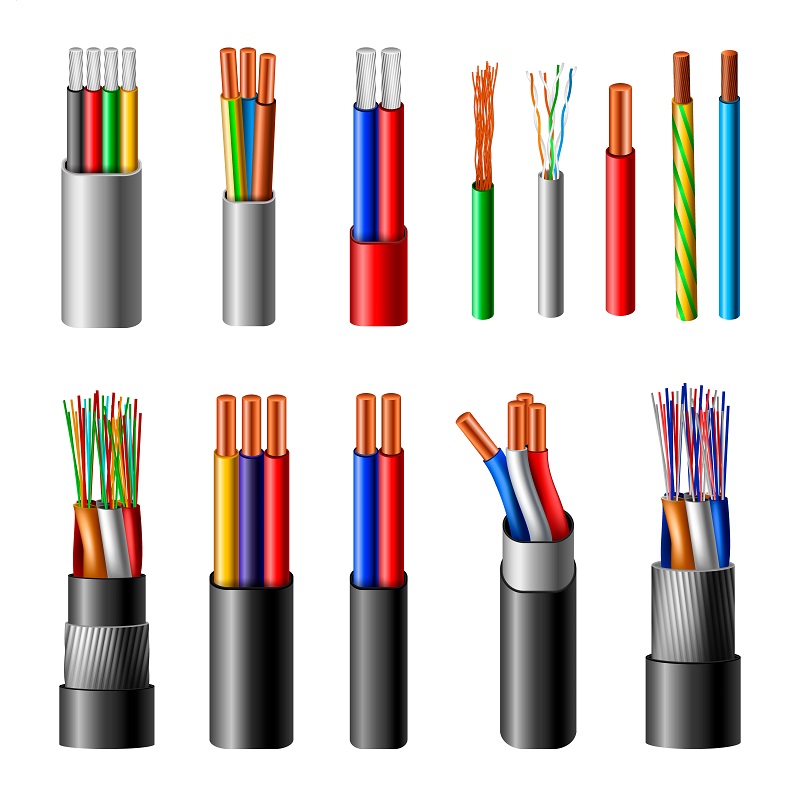
- November 19, 2023
- By Endeavour Electric
- Winnipeg Electricians
The overheating of these conductors led to their failure, highlighting the vital importance of having the right wire size for any installation project. Safety and efficiency should always be the top priorities. Inadequately sized conductors can lead to voltage drop, overheating, short-circuiting, or fire hazards if not correctly sized. Knowledge of proper conductor sizing ensures that power flows smoothly without causing heat buildup or voltage drops. Understanding the requirements for equipment and locations to calculate wire size capacity based on phase and load calculations is just one aspect of what we cover in depth.
Importance of Appropriate Electrical wire Size
To ensure the safe and efficient functioning of an electrical system, selecting appropriate wire sizes is of utmost importance. Electrical wires (also referred to as wires) play an essential role in transporting electricity between sources and various devices in your electrical network. Let’s examine why selecting proper sizes matters so much.
Understanding Temperature Correction of Electrical wires
Temperature correction is a crucial element in precise current-carrying capacity calculations, especially when it comes to electricians Winnipeg. Accurate temperature correction factors help compensate for alterations in wire resistance due to temperature fluctuations and material properties affecting its resistance. Different materials have varying temperature coefficients, significantly impacting wire resistance calculations. By utilizing dependable calculations that incorporate precise temperature correction factors, we can guarantee reliable assessments of current-carrying capacity.
Why does temperature correction matter? Failing to account for it increases our risk of underestimating or overestimating ampacity (current-carrying capacity) of wires, potentially resulting in overheating, potential wiring system damage and fire hazards.
Bundling Considerations for Electrical wires
Heat dissipation becomes an issue when multiple wires are combined into bundles, and its dispersion becomes paramount. Tightly packed wires reduce their ability to dissipate heat efficiently – meaning if their ampacity limit exceeds recommended limits they are more likely than not overheat and become problematic.
Installation by a Winnipeg residential electrician must consider both spacing and ventilation to prevent excessive heat buildup in wire bundles. This approach aids in efficiently dissipating heat and reduces the risk of overheating. Ensuring adequate airflow around these bundles is essential for effective heat dissipation, thereby minimizing the risk of excessive temperatures accumulating inside them.
Here are a few important considerations:
Proper Spacing: Ensuring proper spacing among individual wires within a bundle provides improved airflow and heat dissipation.
Ventilation: Ensuring sufficient ventilation around wire bundles helps mitigate against heat build-up.
Derating Factors: Derating factors must be calculated when selecting an adequate wire size for bundled installations, since their purpose is to account for reduced ampacity caused by bundling.
Bundling considerations enable us to ensure that electrical wires are appropriately sized to handle current loads without overheating or endangering safety.
Importance of Selecting Current-Carrying wires
Selecting electrical wires of appropriate sizes is vital in order to maximize current-carrying capacity and prevent potential issues. Here’s why:
Voltage Drop: Undersized wires, when handled by a residential electrician Winnipeg, can result in voltage drops, causing a decrease in electricity flow through their wires. This can have adverse effects on electrical devices and equipment connected to the circuit. Voltage drops may diminish performance as electricity travels along its path, ultimately leading to decreased functionality of connected equipment and devices..
Energy Efficiency: Oversized wires incur unnecessary expenses and energy wasteful usage, driving up material expenses while simultaneously leading to ineffective energy use. By purchasing larger wires than necessary, material expenses increase while excess consumption leads to unnecessary energy usage.
Safety risks: Electrical wires that do not meet standard sizes could become overwhelmed by their current load, leading to overheating, insulation melting or even fire hazards.
To prevent issues associated with current-carrying capacity (current-carrying ampacity) limitations and industry standards and regulations, wire sizes should correspond with acceptable ampacity (current carrying capacity). By choosing wires that match these specifications we can ensure safe operations while minimising voltage drops and optimizing system efficiency.
Accurate Gauge Determination in Electrical wires
Cost Saving Advantages of Employing Properly Sized Electrical wires
wire size is of paramount importance when it comes to establishing efficient and cost-effective electrical systems with a Winnipeg electrical contractor. Precisely estimating the gauge is crucial to steer clear of costly errors like oversizing or undersizing. Let’s delve into why the use of properly sized electrical wires results in financial savings.
An important benefit of properly sized wires is minimizing material costs. When we select wires that are too big for an intended application, money is wasted by purchasing unnecessarily large quantities of wire; on the other hand, selecting too small wires risks overheating and potential system damage; when choosing wire gauge based on accurate calculations we strike a balance between safety and cost efficiency.
Efficiently sized wires also reduce energy losses and lead to lower utility bills over time. When current flows through an undersized wire, resistance increases dramatically resulting in voltage drop and lost energy – negatively impacting system performance while simultaneously raising electricity costs for end users. By selecting appropriately sized wires with sufficient ampacity we minimize energy waste while optimizing energy efficiency.
At the core of it all is the goal to minimize future expenditure on maintenance expenses while simultaneously increasing longevity and reliability of our electrical systems. If our electrical system contains undersized wires that cannot keep pace with load demands, these could eventually deteriorate from excess heat generated during operation and lead to frequent failures requiring costly repairs and upgrades in future years. By investing in suitable wires from day one we ensure longevity, reliability and ultimately save money through reduced future maintenance expenses.
Proper wire sizing is essential for optimizing system performance and minimizing costs with an electrical contractor Winnipeg. Picture operating vital machinery in your factory or relying on uninterrupted power supplies for essential operations. Undersized wires can jeopardize critical functions, leading to costly downtime and potential damage to connected equipment. Choosing adequately sized wires with ample ampacity ratings guarantees reliable electrical operation while reducing the risk of disruptions and failures.
Proper wire Sizing Is Critical for Owner or User Success
Correctly sized wires not only reduce cost savings; their relevance extends far beyond cost considerations to safety and user experience. Let us explore why accurate sizing of wires is crucial in creating reliable electrical systems that operate effectively and safely.
One primary advantage is ensuring safe electrical operation with properly-sized wires. Undersized wires pose fire risks; on the other hand, oversized ones could interfere with terminals and connectors, leading to loose connections or possible arcing issues if you use too little current through them. By selecting gauge-sized wires accurately we reduce these risks and prioritize safety.
Correct wire sizing, handled by a Winnipeg electrician, minimizes downtime and maintenance expenses by addressing voltage drop problems associated with undersized wires. These issues can result in poor equipment performance, particularly with motors and appliances, due to voltage drops. Consequently, frequent breakdowns and heightened maintenance needs may arise. Opting for appropriately sized wires with sufficient ampacity effectively eliminates voltage drop concerns and enhances overall reliability in our electrical system.
Proper wire sizing not only ensures greater safety and maintenance costs savings, but it can also maximize efficiency of connected equipment. By matching gauge wire to specific load requirements we ensure optimal power delivery without unnecessary losses or inefficiency and ensure devices operate optimally at their designated levels, increasing productivity while decreasing energy waste.
Choosing the ideal gauge wire through accurate calculations offers numerous advantages for owners or users of electrical systems in Winnipeg. These benefits include reduced material costs by eliminating oversize or undersize errors, lower utility bills through reduced energy losses, avoidance of unnecessary replacements or upgrades, reliable operation with minimum downtime, improved safety features, reduced maintenance costs, and enhanced equipment performance. Prioritizing properly sized electrical wires enables us to build efficient, safe, and dependable electrical systems tailored specifically to our needs.
FAQs
FAQ 1 : Why Is Correct Electrical wire Size Essential?
Utilizing appropriately-sized electrical wires is paramount, especially when considering the services of an electrician Winnipeg. Firstly, employing properly sized wires is essential for maintaining the safety of your electrical system. Undersized wires have the potential to overheat, leading to fires or equipment damage, while oversized wires can result in inefficient power transmission and increased energy consumption.
FAQ 2: How can I identify the appropriate size of electrical wires for my application?
To properly size electrical wires, one should carefully consider factors like anticipated maximum current in a circuit, length of wire and insulation material used. Consulting an electrician or national electrical codes and standards may prove invaluable when making calculations that provide accurate sizing calculations.
FAQ 3: Are There Signs That Indicate Improper Sizing Of Electrical wires?
Some common indicators that might point towards undersized electrical wires include frequent tripping of circuit breakers or blown fuses, flickering lights, overheated outlets or switches and appliances not functioning at full capacity. If these signs arise it’s imperative that professional inspectors come inspect your wiring to assess it as soon as possible.
FAQ 4: Could smaller wires help me save money?
While using smaller wires may initially seem cost-cutting, over time this strategy could become much more costly in the form of increased resistance and voltage drops leading to reduced efficiency or possible damage of connected devices. Therefore, investing in appropriately-sized wires for maximum performance and safety would always be best practice.
FAQ 5: Are There Legal Requirements Regarding Electrical wire Sizing?
Indeed, every country and its regions, including those within countries, maintain legal regulations concerning proper wire sizing. Adherence to these regulations is crucial to prevent hazards arising from inadequate wire sizes and to ensure the safety of installations. As a result, it is imperative for anyone seeking electrical services in Winnipeg to ensure that electricians comply with local codes or hire accredited professionals, as this guarantees compliance and the execution of safe installations.
FAQ 6: Am I allowed to use larger wires for improved performance?
Although oversized wires might seem appealing for improved performance, this strategy should not be employed. Oversized wires can add unnecessary material usage and higher energy use; furthermore they could cause compatibility issues between devices designed for specific wire gauges and your wire gauge selections. Therefore, it’s wise to adhere to proper sizing guidelines in order to optimize electrical system efficiency.
FAQ 7: Where can I obtain professional assistance to assist me in selecting appropriate electrical wire sizes?
When in doubt, always seek professional assistance from qualified electricians or electrical engineers experienced with electrical wire sizing. Their experts possess the know-how needed to precisely calculate wire sizes based on your individual requirements ensuring safe and efficient installations of electrical systems.
